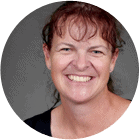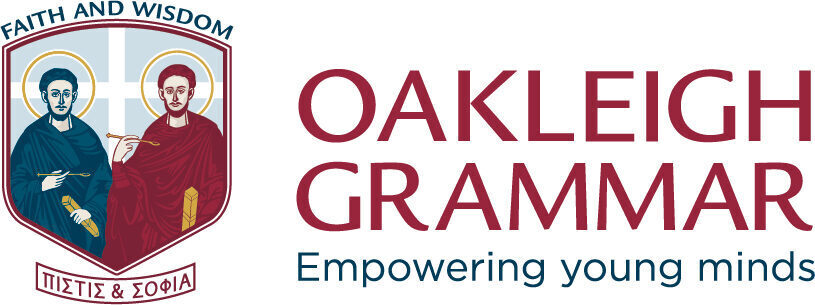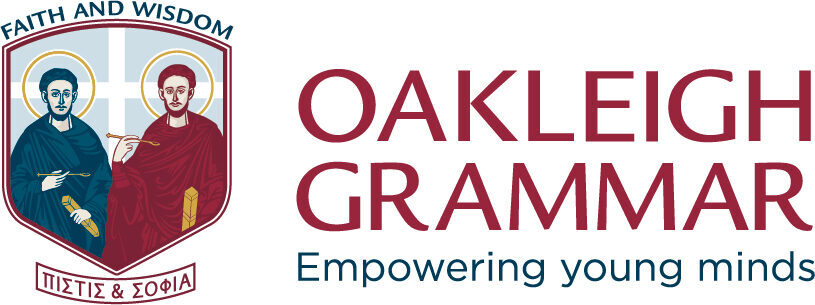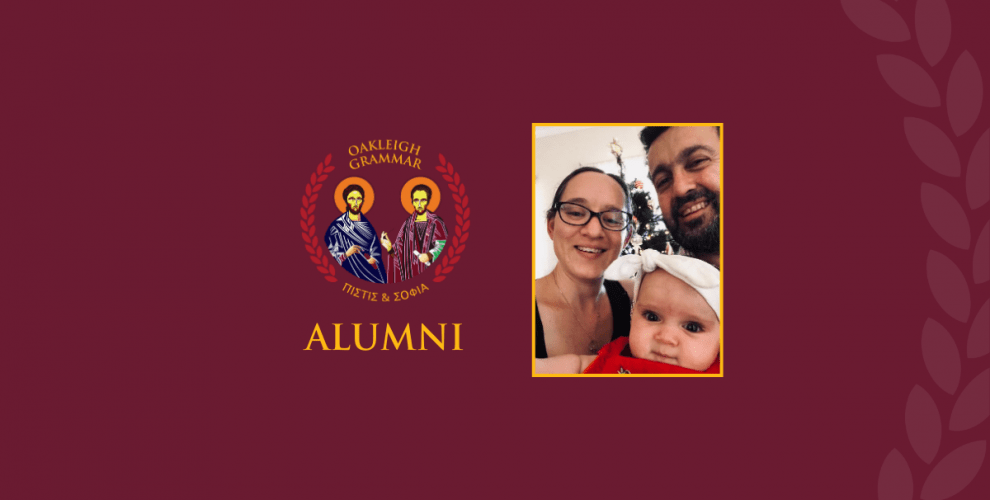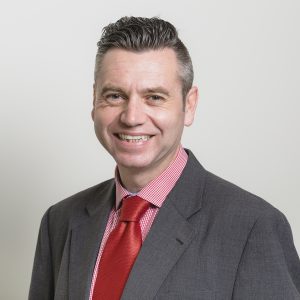Oakleigh Grammar strives for creating a strong sense of belonging for our students to the School Community, its Greek heritage and Orthodox Christian Values. This belonging and connection with the Community doesn’t disappear after finishing up at School, and for some students it can have a lasting effect on their lives. This is particularly the case for Eleni. After graduating from Oakleigh Grammar in 2001, she took her experiences, relationships and interactions she had at school into her adulthood, and now into motherhood. Eleni has kindly offered to tell us how Oakleigh Grammar has influenced her identity as she shares her journey from being a student, to becoming a teacher and an aide, to how her life has changed completely since becoming a stay at home mother.
What is the most memorable or important thing you learnt whilst at Oakleigh Grammar?
I was in Secondary School. The wind was biting as I hurried to get to School. I walked past the church, crossed the road and headed towards the front entrance. As I passed the Community Hall, I saw the priest standing in the garden, in his navy blue anteri (cassock), bent over pulling out weeds. This image is the most important thing that I learnt. This man was not the gardener, it was not his job to pull out weeds but there he was. Fr Nicholas loved the School, Sts Anargiri, as it was called then. His contribution went beyond preaching. It was practical, humble and full of love. It taught me that if you love something, you tend to it, doing whatever needs to be done, even the most ‘menial’ task, with all your heart. Then the ‘menial’ becomes a great accomplishment. It becomes your glory.
What advice do you have for current students to help them make the most of their experience at Oakleigh Grammar?
Learn how to learn. It may become one of the most valuable skills you acquire but more specifically, think about how this School differs from most other schools. Though I am aware that there are a number of programs that the School offers, I would like you to focus on what really makes it stand out. The Language and the Faith. Yes, some of you may be rolling your eyes saying, “How is the Greek language ever going to help me in my career? Orthodox Studies is so boring.” What I have to say to you is that ‘who you are’ plays just as an important role in understanding yourself, navigating through life and being successful, as an academic education does. You may not believe this (you may even think I’m crazy), but one day you will want to teach your children the Greek language, customs and Orthodox Christian Faith. Take what you can now, for yourselves and for your children. To those students who are not of Greek heritage or Orthodox Faith I say, take what you can from these opportunities to expand your minds. Take the good from what you learn as the bee collects pollen from the flowers.
How has an Oakleigh Grammar education contributed to the person you are today?
Every experience and interaction during my schooling years has made me who I am today. Yet the greatest impact that my education provided was in the realm of self-discovery, as mentioned above; my identity. I have a great love for my Faith, culture, language and history and this is largely due to the teachers I had. Teachers like Mr Panagopoulos, who would dictate to us from the Greek newspaper, Neos Kosmos, insisting that if we knew the rules of grammar then we would have no problem getting the spelling correct. Teachers like Mrs Papadopoulos whose two hour Orthodox Studies exams were so detailed that even I struggled to finish. Teachers like Ms Moutafis (now Sister Theolekti) who indulged us with constant Q&A of the Orthodox Faith. I love where I have come from and those who came before me and hope that I can pass on this treasure to my daughter.
What do you consider to be your greatest accomplishments (both personally and professionally) since leaving School?
Professionally, my greatest accomplishment was being a Integration Aide at Red Hill Consolidated School, a Primary School. I gave up on teaching as I could clearly see that I did not have the gift of classroom management, aka. discipline. I completed a Diploma in Counselling but found myself, quite by accident, as a Learning Support Officer in a boy’s Secondary School. This changed my life at the time. Although aide work is not as prestigious as teaching or financially fruitful and generally lacking in job security, it has been the most rewarding. All teaching graduates should be required to work as an aide. The aides see what the teacher doesn’t get an opportunity to see and gains an enourmous insight into how students learn, both those with and without special needs. When I moved into the primary setting it was a completely different ball game. For three months I kept asking myself what I was doing there but I persisted, asked questions, made myself vulnerable and revealed my inadequacies. Judging from the results I think I became a good aide and I would consider going back to teaching because I am so much more equipped now than what I was.
Personally, my greatest accomplishment is my family; my husband and my daughter. To explain it any further I would have to write a book!
Why did you decide to take up teaching?
To be honest, I don’t really know what it was that made me choose teaching. I suppose I have always been the type of person who loves to help people. My grandfather had completed an Arts Degree followed by a Diploma of Education, both my mother and aunty taught at the School as well, so I suppose these were my influences. I remember sitting with my Physics teacher, Mr Stoforidis, towards the end of my final year to discuss my preferences. He was stumped as to why I had chosen to do an Arts degree considering I had focussed on maths and science in my VCE. He was desperately trying to convince me to consider a degree in engineering as there were scholarships being awarded to female applicants. As he desperately tried to change my mind, he asked me with great animation (and exasperation), “why do you want to become a teacher?!”. I don’t remember what I answered but I thought to myself, “You are a teacher…” and a good one at that! I think that was my answer, I wanted to make an impression on young people’s lives, just as he and others had made on mine.
How has your life changed since becoming a Mother? Do you think having a career in teaching and as an aide has helped you with early motherhood?
Where do I begin? So many things have changed, but to sum it up: sacrifice and selflessness. What I couldn’t achieve from my own efforts, my daughter is achieving for me, every day. No more going to the toilet on your own, having a good night’s sleep or enjoying a piece of toast. As the toddler says “what’s yours is mine and what’s mine is mine!” but all humour put aside, it’s so much more than that. If you are a mother, you know what I’m talking about. If you’re not a mother… then you’ll have to become one to understand. Being a mother is by far the most difficult thing I have ever done and the most rewarding. I have relinquished my career to ‘grow’ my child and have no regrets. ‘Stay at home mum’ may not be as prestigious as having a ‘career’ but this child will one day grow into a valuable member of society and the early years are when the foundations are laid.
I wouldn’t say that teaching has helped me with early motherhood as such. I am certainly more aware of developmental milestones, especially with regards to literacy, as a result of my Integration Aide experience in a primary school. If anything, it is my work as an aide that has assisted me. In working one-on-one with children who have special needs, you gain a real insight into the processes, skills and knowledge required for learning. For example, teaching my daughter how to go up and down stairs, or sticking two blocks together. However, I am also aware that not everything is about learning and some things are just for fun! I’ll have to keep reminding myself about that!
What are some important lessons you have learnt since becoming a mother? Do you have any tips you would like to share with future parents?
Well, I don’t have a lot of experience as my girl is only 16 months old but what I’ve learnt so far:
Don’t compare your child to other children, they’re all different.
Enjoy watching them grow and learn.
Forget the housework, it will still be there no matter what.
Read the same books over and over and over…
They won’t starve!
Dirt is good.
Dried out dog poo is even better.
If it’s quiet, your toddler is probably drinking out of the toilet bowl or halfway up the stairs.
But seriously… communication. In the words of a fellow mother and dear friend, “motherhood can be very lonely”. There is a lot of joy, but also many difficult and challenging moments. The joys of motherhood are often celebrated but the struggles are rarely spoken of. Especially the challenges that first time mums are often (but not always) faced with. Traumatic labour, difficulties breastfeeding, isolation, sleep deprivation, post-natal depression, etc. Communicate with family members about how you are feeling and how they can be of support. Talk with friends (especially mothers with young children) to gain advice and perspective. Enlist the support of professionals like Maternal Child Health Nurses and various hotlines. Communication is essential to get through the challenges and get the support you need. It is totally worth it in the end. Mothers are amazing people!
How has it been raising a child during a pandemic?
Don’t even go there…
Honestly, for me personally, it has been very difficult. It is not easy to entertain a toddler within four walls and one hour of exercise a day. I am home alone most of the time which makes it even more challenging, especially when she’s going through a ‘phase’, like teething. I have been fortunate that I have found some neighbours to walk with because as much as I love toddler babble, there’s nothing like a bit of adult conversation. I no longer think of the time ahead, but just focus on the day at hand (otherwise I’d probably have a meltdown). Also during this time dedicated to the Theotokos I have found that praying as a family has given me a lot of strength.
Lastly, what is some advice you wish you could give to your younger self?
The advice that my spiritual father, Bishop Iakovos Tsigounis, once gave me:
“Just be”.
